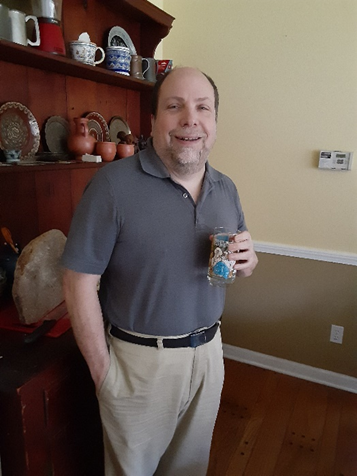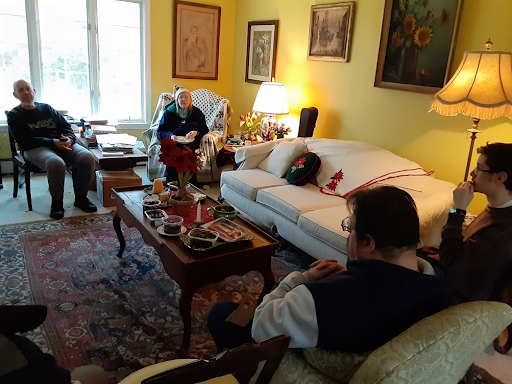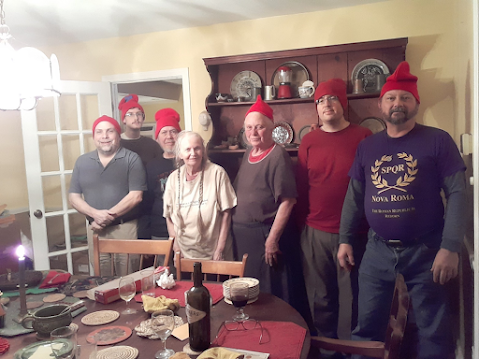Attendees: Sibylla
Ambrosia Fulvia (Hostess)
Marcus
Quintius Clavus
Aula Tullia
Scholastica
Flavius
Vedius Germanicus
Aulus
Iulius Paterculus
Quintus
Valerius Callidus
Marcus
Cassius Iulianus
Numerius
Octavius Astronomus
Cindy
Fl.
Vedius Germanicus and I arrived at the house of Sibylla Ambrosia Fulvia’s house
around noon. M. Quintius Clavus and A. Tullia Scholastica had already arrived. Sibylla
offered coffee and tea to her guests; Quintius was having an herbal blend which
happened only to contain ingredients known to the Romans.
We started to converse on various
topics, and more people joined gradually. Q. Valerius Callidus was next to
arrive. “Finally, an event!” he said cheerily as he walked through the door. I
pointed out that there had been a small gathering at Sibylla’s house in March of
that year, but he had not heard about it at the time.
Vedius and Callidus discovered an
extraordinary coincidence – the two of them had actually grown up in the same
town at the same time, and knew many of the same people, even though they didn’t
remember meeting each other before.
M. Cassius Julianus followed soon
after. He had brought a few trays of antiquities which some other members of
the group helped to carry into the house.
N. Octavius Astronomus came just
a little later. Sibylla escorted Octavius on a short tour of her house, since
he would be staying overnight.
Everyone spent a long time in
conversation with others. Cindy, Sibylla’s roommate arrived and participated a
bit in conversation as well. Even one of Sibylla’s usually shy cats (the bolder
of the two) came by the living room where most people were seated. A spread of
snacks brought by the participants, including olives, cheese, and stuffed grape
leaves was laid out for enjoyment as we talked.
Scholastica reviewed a bit of Latin
vocabulary she had taught her hostess, and shared the names, both Latin &
English, of the numerous birds visible from Sibylla’s back window. I told
Cassius, Vedius, and Octavius about the activities which P. Aurelius Barbatus, the
new governor of America Cismississippiana, had been organizing.
We were so caught up in our
conversations with one another, that we lost track of the activities we had
planned. However, consul Scholastica eventually noted that time was growing
late and called everyone’s attention. We all gathered in the living room, where
Scholastica gave a few opening remarks followed by a short lesson drawn from
Chapter 1 of Conversational Latin for Oral Proficiency by John C.
Traupman.
Figure 1: Scholastica gives a lesson
After the lesson, we had a Zoom
meeting in which we were joined by two friends from abroad, Cn. Cornelius
Lentulus in Hungary & D. Claudius Aquilinus in Germany. This meeting was recorded
and can be seen at https://youtu.be/9cur16B-6PQ.
During the course of that call, I handed out pilei which I had brought. Callidus
had to leave around that time.
After the meeting, Vedius donned
his augural garb and offered a sacrifice of wine and incense to Saturn.
One of
the items included in this ceremony was a Nova Roman banner, which was supplied
by Scholastica and which had been blessed by Lentulus in Rome. Cassius
discussed the issues which made it prohibitively expensive to print high-quality
Nova Roman flags with Octavius and Vedius, suggesting that ordering just one
such flag for the province as a whole would be a good solution.
We then
went to the dining room, where we enjoyed a meal of bread, chicken, stuffing, sausage,
polenta, as well as the remnants of the Roman snacks which we had been enjoying
in the living room. Dessert was cheesecake provided by Quintus.
After
dinner, we took a group photo.
Vedius
had to leave to travel back to New Jersey, so Cassius took this opportunity to
give him, and the rest of us, a set of gifts: a Saturnalia card, a medallion
bearing Nova Roma’s logo, and a Byzantium Novum coin. Vedius showed Cassius the
medallion he was wearing, which Cassius had struck in commemoration of Nova
Roma’s founding years ago. Vedius had found this shortly before the meeting, which
Octavius suggested might be an omen that this was a new beginning for Nova Roma.
After
Vedius departed, we had a presentation from Sibylla about the Roman spice trade.
Sibylla listed specific spices traded from various regions of Asia along with
their uses. A book with maps of these trade routes was passed around for our
consideration. It was also mentioned that silphium plants, previously thought
to have gone extinct during the Roman period, may have been located. In the
living room, Sibylla set up a variety of the spices referenced in her
presentation for us to smell, including nutmeg, long pepper, galangal, mace,
frankincense, and myrrh. A highlight was comparison between cassia (the cinnamon
with which we are more familiar today) and true (Ceylon) cinnamon. Sibylla
provided plastic bags and invited us to take a sampling of spices as a
Saturnalia gift.
Astronomus,
Sibylla, Cassius, and I all signed up to give presentations in 2023. A variety
of topics were suggested by the four of us, and each of us chose one or a few
topics at random.
Cassius,
in his capacity as governor of Nova Britannia, appointed Octavius as Praefectus
Regionis Montis Viridis (organizer and point of contact for Vermont), agreeing
to follow this up with an edict to the same effect on Main List.
Scholastica
gave a presentation on clothing in ancient Greece & Rome. Wearing examples of
each as she described it, Scholastica told us about the Doric peplos,
Attic peplos, and palla; a few examples of men’s clothing were
also included in the presentation. She also had recreations of ancient
jewellery to pass around and gave each attendee a print of a picture she had
drawn herself of a woman wearing a Doric peplos.
Many
thanks to M. Quintius Clavus and Fl. Vedius Germanicus for the beautiful
pictures included in this report. Thanks also to Q. Valerius Callidus, Vedius,
and A. Tullia Scholastica for reviewing this report: any lingering mistakes are
of course my own.





















